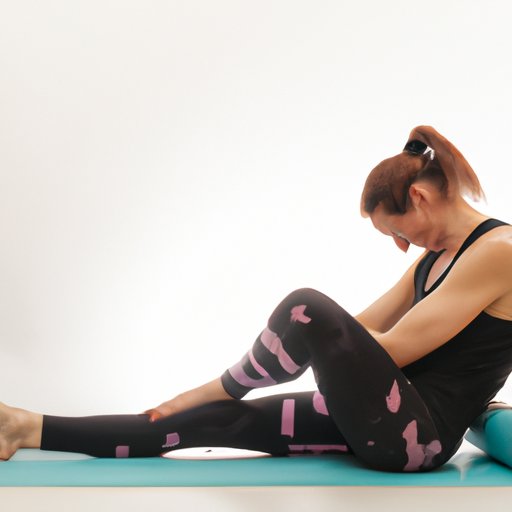
Introduction
If you’re dealing with a sore or tight back, you’re not alone – many people experience discomfort in this area due to factors such as poor posture, lack of movement, and stress. However, there are steps you can take to alleviate pain and improve your overall back health. In this article, we’ll explore tips and techniques for stretching your back and increasing flexibility and range of motion.
The Benefits of Stretching Your Back
Stretching your back can have a significant impact on your overall health. In addition to reducing pain and discomfort, stretching can improve your posture, increase blood flow to the area, and even help you sleep better. According to a study published in the Journal of Athletic Training, regular stretching can improve range of motion and reduce the risk of injury.
Simple Stretches You Can Do Throughout the Day
You don’t need to set aside an hour each day to stretch – there are simple movements you can do throughout the day to alleviate tension and improve your flexibility. Try incorporating these stretches while you’re sitting at your desk or watching TV:
- Shoulder Rolls: Roll your shoulders forward and up towards your ears, then back and down, creating circles. Repeat for 10-20 reps.
- Standing Hamstring Stretch: Stand with your feet hip-width apart and hinge forward at your hips, reaching for your toes. Hold for 30 seconds.
- Seated Spinal Twist: Sit with your legs crossed and twist your upper body to one side, using your opposite arm to deepen the stretch. Hold for 30 seconds, then switch sides.
Incorporating Yoga Poses into Your Routine
Yoga can be an excellent way to improve your back health and overall flexibility. Here are a few poses that target the back:
- Downward Dog: Start on your hands and knees, then lift your hips up towards the ceiling with your hands and feet planted on the ground. Hold for 30 seconds.
- Child’s Pose: Kneel on the ground with your toes touching and your knees apart. Stretch your arms out in front of you and place your forehead on the ground, feeling a stretch in your back. Hold for 30 seconds.
- Spinal Twist: Lie on your back with your arms in a T shape, then cross your right leg over your left and shift your hips to the right. Hold for 30 seconds, then switch sides.
Using Tools to Target Tight Muscles and Release Tension
Foam rollers and massage balls can be helpful tools for targeting specific areas of tightness or pain in the back. Here’s how to use them:
- Foam Roller: Lie on your back with the roller under your shoulder blades, then slowly roll up and down your spine.
- Massage Ball: Place the ball between your back and a wall, then move up and down to target tight areas.
Breathing Techniques to Relax the Body and Mind
Deep breathing can activate the parasympathetic nervous system and help you relax. Try these techniques:
- Deep Belly Breathing: Lie on your back with your hands on your stomach. Inhale deeply, feeling your stomach rise, then exhale and feel it lower. Repeat for several breaths.
- Alternate Nostril Breathing: Hold your right nostril closed with your thumb, then inhale through your left nostril. Hold both closed briefly, then release your right nostril and exhale through it. Repeat on the opposite side, alternating for several breaths.

Proper Form and Alignment While Stretching
It’s important to maintain proper form and alignment while stretching to avoid injury. Here are some tips:
- Engage your core muscles to support your back.
- Start slowly and don’t push beyond your limit.
- Listen to your body and adjust the stretch as necessary.
Tips for Long-Term Flexibility and Incorporating Stretching into Your Daily Routine
Consistency is key when it comes to stretching. Try these tips for making it a regular part of your routine:
- Set a reminder to take a stretching break every hour at work.
- Incorporate yoga or a stretching routine into your workout schedule.
- Get up and move throughout the day to avoid stiffness.
Conclusion
Stretching your back can be incredibly beneficial for alleviating pain and improving your overall health. By incorporating techniques like daily stretches, yoga poses, and breathing exercises, you can increase your flexibility and range of motion. Additionally, using tools like foam rollers and massage balls can help you target specific areas of tension. Remember to listen to your body and consult with a professional such as chiropractor or physical therapist if you have any concerns. With consistency and patience, you can achieve long-term benefits for your back health.





